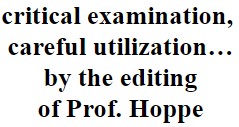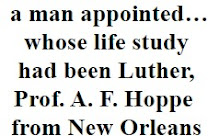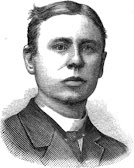Luther's Works.
And so, with God's help, the work decided upon and begun in the fall of 1879 has been happily completed. This new edition of Luther's works is called the St. Louis Edition. From the old Walch edition, essentially nothing else has remained than the arrangement and order of Luther's writings. The Latin writings of Luther are available in this edition of ours in a new, verbatim, almost literal translation and are thus made accessible even to non-theologians. The German writings have a text cleansed as far as possible of extraneous ingredients, punctuation that disturbs meaning, and other defects and inaccuracies. Editorial errors are unavoidable in such a large work of 24 or 23 volumes.
However, the undersigned, who has also looked a little into the old and the new editions of Luther's works, confidently dares to claim that there are fewer errors in our edition than, for example, in the Erlangen edition, and that in this respect it does not lag behind the Weimar edition. The extensive historical introductions, which our edition offers, are a new, independent work of Prof. Hoppe, which not only promotes the understanding of Luther's writings, but also provides new, interesting insights into the history of the Reformation. German Luther researchers have already taken note of this edition of ours from St. Louis and have mostly acknowledged it praiseworthily, remarking, for example, that it completely corresponds to its purpose as a popular edition. Certainly, our edition is a popular edition, intended not only for theologians, but also for the German Christian people, and not a so-called critical edition. We did not have all the old and oldest prints at our disposal, which, for example, the Weimar edition used. But what does “critical” mean in this field?
The proper criticism here does not consist primarily in perpetuating the oldest prints archaeologically with all their errors [Weimar??], but above all in eliminating as far as possible everything that Luther did not write and mean in reality. And for this purpose, in most cases, it is sufficient to pay close attention to the meaning of the surviving text and, above all, to the context. As for this critical side of our edition, we read in the well-known “Lehrbuch der Kirchengeschichte für Studierende von Joh. Heinr. Kurtz, der Theologie Doktor und emeritiertem Professor". Eleventh edition. Second volume. First Part, Leipzig 1890, p. 39 (§ 131, 2: Luther’s Table Talk) — the following verdict:
“The until then best complete edition by Förstemann and Bindseil, Lpz. 44 ff. is far surpassed in critical examination and careful utilization of all sources opened up until then by the editing of Prof. Hoppe for the 22nd vol. of Walch's Luther edition (St. Louis 87. 4°), renewed on behalf of the Missouri Synod.”
The other volumes of our Luther edition also have their share in this “critical review”. The fact that it is also well furnished externally, above all offers a clear, exact, easily legible print, has already been emphasized from various sides, as anyone who has already taken a look at it can see.





.jpg)
.jpg)



.jpg)
%20Wikipedia%202022-05-04%20114754.jpg)
.jpg)
